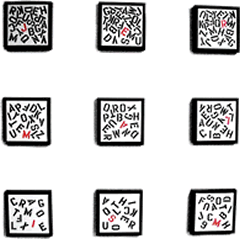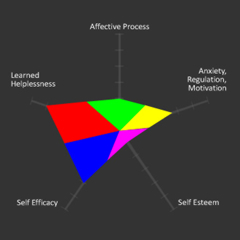
project outline | design | post-project
discourse study-blog | resources | lit review maps | profiles
enquiry research QNR | dysdefs QNR | dysdims QNR
thesis overview | literature | research design | data & analysis | discussion | conclusions
discourse study-blog | resources | lit review maps | profiles
enquiry research QNR | dysdefs QNR | dysdims QNR
thesis overview | literature | research design | data & analysis | discussion | conclusions
 project outline
project outline
Exploring relationships between dyslexia and academic confidence in Higher Education
 The aim of this research project is to explore the relationship between the learning difference of dyslexia and speecific aspects of academic agency amongst Higher Education students. Zimmerman (1995) spoke of academic agency as 'a sense of [academic] purpose, this being a produce of self-efficacy and academic confidence that is then the major influence on academic accomplishment' and it is through the principal concepts of academic self-efficacy and academic confidence that this research project will be tackled. Exploring these relationships and how they are impacted upon by the learning difference of dyslexia is important because relationships revealed may contribute to the emerging discussion on the design of learning development (aka 'support') for groups of learners who feel marginalized or disenfranchised because conventional learning curriculum delivery tends to be misaligned with their learning strengths, or due to their perceived stigma about being labelled as 'disabled' in a learning context. This project is particularly topical at this time in the light of dyslexia being detached from the (UK) Disabled Students' Allowance in the near future. Hence the research may contribute to an expected raised level of discourse about creating more inclusive curricula that supports a social justice agenda by arguing for a wider provision of undifferentiated learning development that is fully accessible and actively promoted to the complete, coherently integrated student community in HE.
The aim of this research project is to explore the relationship between the learning difference of dyslexia and speecific aspects of academic agency amongst Higher Education students. Zimmerman (1995) spoke of academic agency as 'a sense of [academic] purpose, this being a produce of self-efficacy and academic confidence that is then the major influence on academic accomplishment' and it is through the principal concepts of academic self-efficacy and academic confidence that this research project will be tackled. Exploring these relationships and how they are impacted upon by the learning difference of dyslexia is important because relationships revealed may contribute to the emerging discussion on the design of learning development (aka 'support') for groups of learners who feel marginalized or disenfranchised because conventional learning curriculum delivery tends to be misaligned with their learning strengths, or due to their perceived stigma about being labelled as 'disabled' in a learning context. This project is particularly topical at this time in the light of dyslexia being detached from the (UK) Disabled Students' Allowance in the near future. Hence the research may contribute to an expected raised level of discourse about creating more inclusive curricula that supports a social justice agenda by arguing for a wider provision of undifferentiated learning development that is fully accessible and actively promoted to the complete, coherently integrated student community in HE.The key research focus will test the hypothesis that, for a significant proportion of students with dyslexia, it is their awareness and feelings about their dyslexia that has a more significant impact on their academic confidence rather than the learning differences that the dyslexic condition itself may present. This is important to explore not only because attributes of academic agency and in particular, academic confidence, are increasingly widely reported as markers of future academic achievement but also because it further raises the issue of how to tackle the 'dilemma of difference' (Norwich 2010) especially as in many studies, dyslexia has been shown to be negatively correlated with both academic confidence and academic achievement (eg: Barrett, 2005, Asquith, 2008, Sanders et al, 2009) indicating that significant interrelationships are present.
 This relationship between dyslexia and academic confidence will be explored firstly through the development of an innovative data evaluation instrument originally derived in the pilot study (Dykes, 2008) from the relatively broad psychological construct of locus of control. The legitimacy for this approach is underpinned by widely but variously reported inter-relationships between the five sub-constructs of self-esteem; self-efficacy; learned helplessness; anxiety, regulation and motivation; and affective process - perhaps more usefully to be referred to as 'learning-related emotions' (Putwain, 2013) - which are to be considered in their psycho-educational contexts. Although it is understood that these sub-constructs may stand alone as psycho-personality traits there is much research (to be explored in detail as part of the project) about inter-relationships both within this sub-group of descriptors and between the sub-group and the broader construct of locus of control although in the context of this project, this is used more as an umbrella term within which the specific constructs being explored will be located. Shown here is an example of one of the profile disagrams that emerged from the pilot study. The complete set is presented here:
This relationship between dyslexia and academic confidence will be explored firstly through the development of an innovative data evaluation instrument originally derived in the pilot study (Dykes, 2008) from the relatively broad psychological construct of locus of control. The legitimacy for this approach is underpinned by widely but variously reported inter-relationships between the five sub-constructs of self-esteem; self-efficacy; learned helplessness; anxiety, regulation and motivation; and affective process - perhaps more usefully to be referred to as 'learning-related emotions' (Putwain, 2013) - which are to be considered in their psycho-educational contexts. Although it is understood that these sub-constructs may stand alone as psycho-personality traits there is much research (to be explored in detail as part of the project) about inter-relationships both within this sub-group of descriptors and between the sub-group and the broader construct of locus of control although in the context of this project, this is used more as an umbrella term within which the specific constructs being explored will be located. Shown here is an example of one of the profile disagrams that emerged from the pilot study. The complete set is presented here:The profiler will be deployed to establish baseline differences between:
- students with identified dyslexia,
- students with no indication of dyslexia
- students with a profile that indicates dyslexia but who are previously unidentified.
- university students who know about their dyslexia exhibit a significantly lower academic confidence than their non-dyslexic peers;
- university students whose profiles show indications of dyslexia but who have no awareness of their likely learning difference do NOT exhibit a significantly lower academic confidence than their non-dyslexic peers.
 It is also recognized that exploring learning histories in a softer, more qualitative way might add depth and meaning to the more unequivocal and absolute outcomes of the quantitative analysis.
It is also recognized that exploring learning histories in a softer, more qualitative way might add depth and meaning to the more unequivocal and absolute outcomes of the quantitative analysis.To enable this, enquiry processess will be embedded into the data-gathering strategies that invite participants to disclose more emotively their thoughts and feelings about the challenges they face and the outcomes they aspire to in their studies at university (within the context of the enquiry).
It is hoped that this process may enable a reflective commentary to be constructed that picks out a thread of tensions that students with dyslexia have experienced in gaining access to learning 'support' and to explore how they may attribute these tensions to stigma attached to their dyslexia due to it being perceived as a disability in the social context of learning. Qualitiative data of this nature has been collected in some previous studies, notably by the researcher in the pilot study to this project (Dykes, 2008) where some of the feelings of participants in that enquiry are presented here:
The research will contribute to the continuing debate on inclusion-differentiation in learning and curriculum design in Higher Education contexts. Additionally, the unique evaluation tool deployed may show promise for development as an alternative to currently described 'diagnostic' processes for aiding the idenfitication of dyslexia in adults, which tacitly support the medical model of dyslexia as a learning disability.